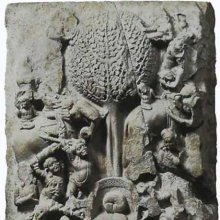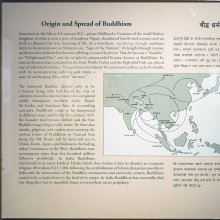Pari: 21 definitions
Introduction:
Pari means something in Hinduism, Sanskrit, Buddhism, Pali, the history of ancient India, Marathi, Jainism, Prakrit, Hindi, biology, Tamil. If you want to know the exact meaning, history, etymology or English translation of this term then check out the descriptions on this page. Add your comment or reference to a book if you want to contribute to this summary article.
Images (photo gallery)
India history and geography
Source: Cologne Digital Sanskrit Dictionaries: Indian Epigraphical GlossaryPāri.—(EI 31; LP; PJS), abbreviation of Gujarāti Pārikha, Pārekha (Sanskrit Pārīkṣaka), originally meaning ‘an examiner of coins’; a surname among the Baniās of Gujarat. Note: pāri is defined in the “Indian epigraphical glossary” as it can be found on ancient inscriptions commonly written in Sanskrit, Prakrit or Dravidian languages.
Source: academia.edu: Minor Chiefs and "Hero" in Ancient TamilakamPāri is a name related to the historical geography and rulers of ancient Tamil Nadu, occuring in Sangam literature such as the Akanāṉūṟu and the Puṟanāṉūṟu.—Notes: Malaināṭu “hill country”, 303 notes Paṟampu (identified with Pirāṉmalai to the east of Maturai at about forty kms)25, Umaṇar (Puṟam. 105-120, VIS 448)

The history of India traces the identification of countries, villages, towns and other regions of India, as well as mythology, zoology, royal dynasties, rulers, tribes, local festivities and traditions and regional languages. Ancient India enjoyed religious freedom and encourages the path of Dharma, a concept common to Buddhism, Hinduism, and Jainism.
Biology (plants and animals)
Source: Google Books: CRC World Dictionary (Regional names)1) Pari in India is the name of a plant defined with Cheilocostus speciosus in various botanical sources. This page contains potential references in Ayurveda, modern medicine, and other folk traditions or local practices It has the synonym Kaempferia speciosa (J. König) Thunb. (among others).
2) Pari is also identified with Cissampelos pareira It has the synonym Nephroica ferrandiana (Gaud.) Miers (etc.).
3) Pari is also identified with Oryza sativa It has the synonym Oryza sativa var. zeravschanica Brches ex Katzaroff (etc.).
4) Pari in Tibet is also identified with Erythrina variegata It has the synonym Chirocalyx divaricatus Walp. (etc.).
Example references for further research on medicinal uses or toxicity (see latin names for full list):
· Bulletin de la Société d’Histoire Naturelle d’Autun (1895)
· An Introduction to the Natural System of Botany (1836)
· A General History of the Dichlamydeous Plants (1832)
· London Journal of Botany (1843)
· Nomenclator Botanicus (1821)
· J. Agric. Trop. (1956)
If you are looking for specific details regarding Pari, for example chemical composition, health benefits, side effects, pregnancy safety, diet and recipes, extract dosage, have a look at these references.

This sections includes definitions from the five kingdoms of living things: Animals, Plants, Fungi, Protists and Monera. It will include both the official binomial nomenclature (scientific names usually in Latin) as well as regional spellings and variants.
Languages of India and abroad
Pali-English dictionary
Source: Sutta: The Pali Text Society's Pali-English DictionaryPari°, (indecl.) (Idg. *peri to verbal root *per, denoting completion of a forward movement (as in Sk. pṛ2, piparti. to bring across, promote; cp. Vedic pṛc to satisfy, pṛṇāti to fill, fulfill. See also P. para). Cp. Vedic pari, Av. pairi, Gr. pέri, Lat. per (also in adj. per-magnus very great); Obulg. pariy round about, Lith. per̃ through, Oir er- (intensifying prefix), Goth. faír, Ohg. fir, far=Ger. ver-) prefix, signifying (lit.) around, round about; (fig.) all round, i.e. completely, altogether. The use as prep. (with Acc. =against, w. Abl. =from) has entirely disappeared in Pāli (but see below 1a). As adv. “all round” it is only found at J. VI, 198 (parī metri causa; combined with samantato). ‹-› The composition form before vowels is pariy°, which in combination with ud and upa undergoes metathesis, scil. payir°. Frequent combinations with other preps. are pari +ā (pariyā°) and pari+ava (pariyo°); sampari°. Close affinities of p. are the preps. adhi (cp. ajjhesati› pariyesati, ajjhogāhati›pariyogāhati) and abhi (cp. abhirādheti›paritoseti, abhitāpa›paritāpa, abhipīḷita›pari°, abhipūreti›pari°, abhirakkhati›pari°), cp. also its relation to ā in var. combinations.—Meanings. 1. (lit.) (a) away from, off (cp. Vedic pari as prep. c. Abl. : ) °kaḍḍhati to draw over, seduce, °cheda cutting off, restriction, °puñchati wipe off.—(b) all round, round (explained by samantato, e.g. at Vism. 271 in pallaṅka): °anta surrounded, °esati search round, °kiṇṇa covered all round (i.e. completely, cp. explanation as “samantato ākiṇṇa”), °carati move round, °jana surrounding people, °dhāvati run about, °dhovati wash all round, °paleti watch all round, fig. guard carefully, °bhamati roam about, °maṇḍala circular (round), °sā assembly (lit. sitting round, of sad).—2. (fig.) (a) quite, completely, very much, kat) ecoxήn: °ādāna consummation, °āpanna gone completely into, °odāta very pure, °osāna complete end, °gūhati to hide well, °toseti satisfy very much, °pūreti fulfil, °bhutta thoroughly enjoyed, °yañña supreme sacrifice, °suddha extremely clean.—(b) too much, excessively (cp. ati° and adhi°): °tāpeti torment excessively, °pakka over-ripe.—A derivation (adv.) from pari is parito (q. v.). On its relation to Sk. pariṣ see parikkhāra. A frequently occurring dialectical variant of pari° is pali° (q. v.).—Note. The explanation of P. Commentators as regards pari is “pariggahaṭṭho” Ps. I, 176; “paricca” SnA 88; “parito” VvA. 316; PvA. 33. (Page 421)

Pali is the language of the Tipiṭaka, which is the sacred canon of Theravāda Buddhism and contains much of the Buddha’s speech. Closeley related to Sanskrit, both languages are used interchangeably between religions.
Marathi-English dictionary
Source: DDSA: The Molesworth Marathi and English Dictionarypari (परि).—A particle and prefix to words from the Sanskrit. Its various powers will appear from the examples below.
--- OR ---
parī (परी).—f In poetry, Kind or sort, or way, manner, fashion, but commonly, prep. In the way, manner, or fashion of; according to; agreeably or suitably with. Ex. vaḍīla vaḍilāmparī bōlaṇāra lēṅkarēṃ lēṅkarāṃ- parī chaḷaṇāra; myāṃ āpalyāparī kāya sāṅgāyācēṃ tēṃ sāṃ- gitalēṃ; navaṛyāparī navarā chaḷatō Elderly people speak as, like &c. elderly people; I have spoken as (in the way or of the kind which) it became me &c. The sense involved in the following examples, though substantially that of the three preceding, is more difficult of explication or detection; yet, as it is of constant occurrence, it should here be attentively investigated. Ex. tākā- parī tāka pāhijē-kharacalēṃ &c.; paikyāparī paikā pāhijē- kharacalā &c. Buttermilk, money &c. must be had, has been consumed &c. just as (exactly in the quantity or manner which is suitable to or usual with) buttermilk, money &c. Pr. bāpāparī bāpa gēlā bōmbalatānā hāta gēlā My father indeed is dead, for fathers to be sure do die; but besides this my hand is gone (broken or hurt) in beating upon my mouth in lamentation for him. Pr. gharā- parī ghara gēlēṃ bāyakōparī bāyakō gēlī. Pr dravyācē parī dravya gēlēṃ āṇi bāyakōcē parī bāyakō gēlī. 2 also parīṃ Like unto; in resemblance unto or in the similitude of. Ex. hyāparī aikuni vāṇī || bōlati rāmāprati kapī sārē ||. 3 conj also parīṃ (Poetry.) But, yet, still. Ex. parī mājhā pāṇḍavākaḍē ōḍhā ||. jyācyā tyācyā parī As the man--so; according to (the rights or requirements of) the person--so. Ex. gharānta vaḍīla manuṣyāsa jyā0 marjī sambhāḷāvī lāgatī or mana dharāvēṃ lāgatēṃ; also ājacyāparī, rōja- cyāparī, nityaparī, divasāparī, kāḷāparī.
--- OR ---
parī (परी).—f ( P) A fabulous monster with a human face, body of a horse, and winged. Formed by Muhammadans to support and set off their tabut in the Muharram. Applied fig. to a beautiful woman &c., a fairy, a sylph.
--- OR ---
pārī (पारी).—f A common term for the integuments or sheaths encircling the kēḷaphūla or flowering head of the Plantain: also for those investing the several phaṇyā or divisions of the grand fruit-stalk enclosed within the kēḷaphūla. The fairer or whiter of them (i. e. the interior) are severally termed (humorously, or in child's play) gāya, the darker-colored, mhaisa. 2 The encircling crust of the sweetmeat mōdaka. 3 W A mango-stone.
Source: DDSA: The Aryabhusan school dictionary, Marathi-Englishpari (परि).—A particle and prefix to words from the Sanskrit. Its various uses will appear from the examples below.
--- OR ---
parī (परी).—f Kind, way. prep. In the way of; Ex. vaḍīla vaḍīlāmparī bōlaṇārā lēṅkarēṃ lēṅkarāmparī chaḷaṇārā. Pr. gharāparī gara gēlēṃ bāyakō parī bāyakō gēlī. parī Like to. conj But, yet, still. jyācyā tyācyā parī As the man-so.
--- OR ---
parī (परी).—f A fabulous monster with a human face, body of a horse, and winged. A beautiful woman &c.
Marathi is an Indo-European language having over 70 million native speakers people in (predominantly) Maharashtra India. Marathi, like many other Indo-Aryan languages, evolved from early forms of Prakrit, which itself is a subset of Sanskrit, one of the most ancient languages of the world.
Sanskrit dictionary
Source: DDSA: The practical Sanskrit-English dictionaryPari (परि).—ind. (Sometimes changed to parī, as parivāha or parīvāha, parihāsa or parīhāsa)
1) As a prefix to verbs and nouns derived from them, it means (a) round, round about, about; (b) in addition to, further; (c) opposite to, against; (d) much, excessively.
2) As a separable preposition it means (a) towards, in the direction of, to, opposite to (with an acc.); वृक्षं परि विद्योतते विद्युत् (vṛkṣaṃ pari vidyotate vidyut); (b) successively, severally (with an acc.); वृक्षं वृक्षं परि सिञ्चति (vṛkṣaṃ vṛkṣaṃ pari siñcati) 'he waters tree after tree'; (c) to the share or lot of (showing bhāga or participation) (with acc.); यदत्र मां परि स्यात् (yadatra māṃ pari syāt) 'what may fall to my lot'; or लक्ष्मीर्हरिं परि (lakṣmīrhariṃ pari) Sk.; (d) from, out of; (e) expect, outside of, with the exception of (with abl.); परि त्रिगर्तेभ्यो वृष्टो देवः (pari trigartebhyo vṛṣṭo devaḥ) or पर्यनन्तात् त्रयस्तापाः (paryanantāt trayastāpāḥ) Vop.; (f) after the lapse of; परि संवत्सरात् (pari saṃvatsarāt) (g) in consequence of; (h) beyond, more than; भृत्याः परि चतुर्दश (bhṛtyāḥ pari caturdaśa) Mahābhārata (Bombay) 3.1.11 (com. adhikacaturdaśāḥ pañcadaśetyarthaḥ; (i) according to, in accordance with; (j) above, over.
3) As an adverbial prefix to nouns not directly connected with verbs, it means 'very', 'very much, 'excessively'; as in पर्यश्रु (paryaśru) 'bursting into tears'; so परिचतुर्दशन्, परिदौर्बल्य (paricaturdaśan, paridaurbalya).
4) At the beginning of adverbial compounds परि (pari) means (a) without, except, outside, with the exception of; as in परित्रिगर्तं वृष्टो दिवः (paritrigartaṃ vṛṣṭo divaḥ) P.II.1.12; VI.2.33. (According to P.II. 1.1. pari may be used at the end of adverbial comp. after akṣa, śalākā, and a numeral to denote loss or defeat in a game by an unlucky or adverse cast of dice' (dyūtavyavahāre parājaye evāyaṃ samāsaḥ) e. g. अक्षपरि, शलाका- परि, एकपरि (akṣapari, śalākā- pari, ekapari); cf. अक्षपरि (akṣapari); (b) round about, all round, surrounded by; as in पर्यग्नि (paryagni) 'in the midst of flames'.
5) At the end of an adjectival comp. परि (pari) has the sense of 'exhausted by', or 'feeling repugnance for'; as in पर्यध्ययनः (paryadhyayanaḥ) = परिग्लानोऽध्ययनाय (pariglāno'dhyayanāya).
--- OR ---
Parī (परी).—(pari-i) 2 P.
1) To go round, circumambulate; (caraṇanyāsaṃ) भक्तिनम्रः परीयाः (bhaktinamraḥ parīyāḥ) Meghadūta 57; Manusmṛti 2.48.
2) To surround, encompass; हुतवहपरीतं गृहमिव (hutavahaparītaṃ gṛhamiva) Ś.5.1; विष- वल्लीभिः परीताभिर्महौषधिः (viṣa- vallībhiḥ parītābhirmahauṣadhiḥ) R.12.61; so कोपपरीतमानसम् (kopaparītamānasam) Ki. 2.25.
3) To go to, think of (objects &c.).
4) To be changed or transformed.
5) To reach to.
6) To run against.
--- OR ---
Pārī (पारी).—
1) A rope for tying an elephant's feet.
2) A quantity of water.
3) A drinking vessel, waterjar, cup.
4) A milk-pail; निगृह्य पारीमुभयेन जानुनोः (nigṛhya pārīmubhayena jānunoḥ) Śi. 12.4.
5) Pollen (of flowers).
Source: Cologne Digital Sanskrit Dictionaries: Edgerton Buddhist Hybrid Sanskrit DictionaryPāri (पारि).—(f.; compare AMg. pārī, a particular vessel, [Ardha-Māgadhī Dictionary]; pārī dohaṇabhaṇḍe, Deśīnāmamālā 6.37, and pārī in Gauḍavaha, [Paia-sadda-mahaṇṇavo]), a kind of (milking?) vessel: suvarṇa-pāri-sahasrāṇi, rūpya-pā°, Mahāvastu iii.450.3—4 (prose); ṣaṣṭi pārisahasrāṇi 459.3 (verse, i not m.c.).
Source: Cologne Digital Sanskrit Dictionaries: Shabda-Sagara Sanskrit-English DictionaryPari (परि).—A particle and prefix to words implying, 1. Ubiquity, (all round, on every side.) 2. Part, portion. 3. Abandonment, (away.) 4. End, term. 5. Sickness. infirmity. 6. Enforcement, stress, (even, very great.) 7. Separateness, several distributions, (each by each, &c.) 8. Embracing, encircling, (round, round about.) 9. Depreciation, exposure of faults. 10. Homage, respect. 11. Rejection, turning off or away. 12. Ornament. 13. Diffusion, extension. 14. Mark or sign. 15. Sorrow. 16. Cessation, stop, impediment. 17. Truth. 18. An exclamation of Pleasure or satisfaction. As parikarttuṃ, to adorn; parikṣipnuṃ, to abandon; parichettuṃ, to divide; paridevituṃ, to lament; parirabdhuṃ, to embrace; parivrajituṃ, to go about, to wander, &c.: see the following compound nouns. E. pṝ to complete, to satisfy, aff. in; in combination with roots forming nouns by ghañ, the i of pari is sometimes optionally lengthened, as parī.
--- OR ---
Pārī (पारी).—f. (-rī) 1. A rope for tying an elephant’s feet. 2. A quantity of water. 3. A drinking cup. 4. A milk-pail. E. pā + kkip-rā-ka-ṅīṣ .
Source: Cologne Digital Sanskrit Dictionaries: Benfey Sanskrit-English DictionaryPari (परि).—and often parī parī (akin to para), I. adv. Round, all round. Ii. prep. 1. with acc. About, against, to, over. 2. with abl. From, out, except, after, [Mānavadharmaśāstra] 3, 119(?); on account, according. Iii. combined and compounded with verbs and their derivatives, Round, all round. Iv. compounded with nouns, Round about, full, quite, excessively.
— Cf. [Latin] per, e. g. in per-idoneus (cf. parā).
--- OR ---
Pārī (पारी).—i. e. pṛ10 + a + ī, f. A cup, [Rājataraṅgiṇī] 5, 368.
Source: Cologne Digital Sanskrit Dictionaries: Cappeller Sanskrit-English DictionaryPari (परि).—[adverb] round, about (often °—, also to denote abundance or high degree); [preposition] round, about, against, opposite to, beyond, above, more than ([accusative]); from, out of, after, in consequence or on account of, according to ([ablative]); *around i.e. outside or with exception of ([ablative], also pari pari).
--- OR ---
Parī (परी).—walk about, circumambulate, surround; come to, attain, get.
Parī is a Sanskrit compound consisting of the terms pari and i (इ).
Source: Cologne Digital Sanskrit Dictionaries: Monier-Williams Sanskrit-English Dictionary1) Pari (परि):—ind. round, around, about, round about
2) fully, abundantly, richly ([especially] [in the beginning of a compound] [where also parī] to express fulness or high degree), [Ṛg-veda] etc. etc.
3) as a [preposition] (with [accusative]) about (in space and time), [Ṛg-veda; Atharva-veda]
4) against, opposite to, in the direction of, towards, to, [ib.] (cf. [Pāṇini 1-4, 90]; also at the beginning of a [compound] mfn.; cf. [ib. ii, 2, 18], [vArttika] 4, [Patañjali] and pary-adhyayana)
5) beyond, more than, [Atharva-veda]
6) to the share of (with √as, or bhū, to fall to a person’s lot), [Pāṇini 1-4, 90]
7) successively, severally (e.g. vṛkṣam pari siñcati, he waters tree after tree), [ib.]
8) (with [ablative]) from, away from, out of [Ṛg-veda; Atharva-veda; Śatapatha-brāhmaṇa] (cf. [Pāṇini 1-4, 93])
9) outside of, except, [Pāṇini 1-4, 88; Kāśikā-vṛtti] (often repeated, [ib. viii, 1, 5]; also at the beginning or the end of an ind. [compound] [ib. ii, 1, 12])
10) after the lapse of [Manu-smṛti iii, 119; Mahābhārata xiii, 4672] (some read parisaṃvatsarāt)
11) in consequence or on account or for the sake of [Ṛg-veda; Atharva-veda]
12) according to ([especially] dharmaṇas pari, according to ordinance or in conformity with law or right), [Ṛg-veda]
13) cf. [Zend] pairi; [Greek] περί.
14) Parī (परी):—1. parī in [compound] for pari.
15) 2. parī (pari-√i) [Parasmaipada] pary-eti ([imperative] parīhi, [Mahābhārata]; [Potential] partyām, [Taittirīya-saṃhitā]; [imperfect tense] paryait, [Śatapatha-brāhmaṇa]; [perfect tense] parīyāya, [Taittirīya-saṃhitā]; [future] pary-etā, [Chāndogya-upaniṣad]; [indeclinable participle] parītya, [Pāraskara-gṛhya-sūtra]; pary-āyaṃ, [Brāhmaṇa]; [infinitive mood] pary-etave, [Ṛg-veda]),
—to go about, move in a circle;
— (trans.) to go or flow round ([accusative]), circumambulate, surround, include, grasp, span, [Ṛg-veda] etc. etc.;
—to run against or into, reach, attain, [Atharva-veda; Śatapatha-brāhmaṇa; Chāndogya-upaniṣad];
— (with or sc. manasā) to perceive, ponder, [Mahābhārata; Rāmāyaṇa] :—[Intensive] [Ātmanepada] parīyate, to move round or in a circle, [Ṛg-veda]
16) Pārī (पारी):—[from pāra] a f. a milk-pail, [Śiśupāla-vadha]
17) [v.s. ...] any cup or drinking vessel, [Vikramāṅkadeva-carita, by Bilhaṇa; Rājataraṅgiṇī]
18) [v.s. ...] pollen, [cf. Lexicographers, esp. such as amarasiṃha, halāyudha, hemacandra, etc.]
19) [v.s. ...] a rope for tying an elephant’s feet, [cf. Lexicographers, esp. such as amarasiṃha, halāyudha, hemacandra, etc.]
20) [v.s. ...] a quantity of water or a town (pūra or pura), [cf. Lexicographers, esp. such as amarasiṃha, halāyudha, hemacandra, etc.]
21) [v.s. ...] a small piece or quantity of anything, [Nalacampū or damayantīkathā]
22) Pāri (पारि):—Vṛddhi form of pari in [compound]
23) Pārī (पारी):—b pārīṇa See under 1. pāra and pāriṇa.
Source: Cologne Digital Sanskrit Dictionaries: Yates Sanskrit-English DictionaryPari (परि):—prep. All round; completely.
Source: DDSA: Paia-sadda-mahannavo; a comprehensive Prakrit Hindi dictionary (S)Pari (परि) in the Sanskrit language is related to the Prakrit words: Pari, Parii, Parī, Palī.
[Sanskrit to German]
Sanskrit, also spelled संस्कृतम् (saṃskṛtam), is an ancient language of India commonly seen as the grandmother of the Indo-European language family (even English!). Closely allied with Prakrit and Pali, Sanskrit is more exhaustive in both grammar and terms and has the most extensive collection of literature in the world, greatly surpassing its sister-languages Greek and Latin.
Hindi dictionary
Source: DDSA: A practical Hindi-English dictionary1) Pari (परि):——a Sanskrit suffix imparting the sense of round, around, about, round about; fully, abundantly, richly; against; in the direction of; beyond; more than; outside of, etc.
2) Parī (परी):—(nf) a fairy, nymph; dream girl, beautiful damsel; ~[khānā] an abode of fairies; ~[jāda] born of a fairy; ~[loka] a fairyland, an abode of pretty women.
3) Pārī (पारी):—(nf) shift; turn; —[pārī] by turns; •[se] alternatively; turn by turn; —[kā bukhāra] alternating fever, fever attacking every alternate day.
...
Prakrit-English dictionary
Source: DDSA: Paia-sadda-mahannavo; a comprehensive Prakrit Hindi dictionary1) Pari (परि) in the Prakrit language is related to the Sanskrit word: Pari.
2) Parī (परी) also relates to the Sanskrit word: Parī.
3) Parī (परी) also relates to the Sanskrit word: Bhram.
Prakrit is an ancient language closely associated with both Pali and Sanskrit. Jain literature is often composed in this language or sub-dialects, such as the Agamas and their commentaries which are written in Ardhamagadhi and Maharashtri Prakrit. The earliest extant texts can be dated to as early as the 4th century BCE although core portions might be older.
Kannada-English dictionary
Source: Alar: Kannada-English corpusPari (ಪರಿ):—
1) [verb] to cut; to sever; to break.
2) [verb] to be cut, severed or broken.
3) [verb] to pluck out (something) using force.
4) [verb] to be separated from.
5) [verb] to remove or destroy (an evil, bad element, annoying person, etc.).
6) [verb] to be destroyed.
7) [verb] to be finished, closed.
--- OR ---
Pari (ಪರಿ):—
1) [verb] to move; to go.
2) [verb] to go by moving the legs rapidly, faster than in walking; to run.
3) [verb] to flow (as a liquid).
4) [verb] to wander; to walk around, to move about.
5) [verb] to go back or backward; to withdraw in the face of opposition; to retreat.
6) [verb] to leve; to depart.
7) [verb] (one’s sight, attention) to fall on.
8) [verb] to come to occupy a wide or wider area; to spread oneself.
9) [verb] to break up and scatter in all directions; to spread about; to distribute widely.
10) [verb] to go out of sight.
11) [verb] to be removed.
12) [verb] to put an end to (grief, distress, etc. of another).
13) [verb] to be finished; to come to an end.
14) [verb] (a meeting, assembly) to be concluded.
15) [verb] to leave or abandon.
16) [verb] to become unstable; to be unsteady.
17) [verb] (a work) to be carried on further satisfactorily.
18) [verb] to be relieved from the burden or responsibility of a debt.
19) [verb] to putforth young leaves and tendrils (as a vine).
20) [verb] to attack; to assault.
21) [verb] to become possible.
22) [verb] to move forward on one’s body (as a snake).
23) [verb] to be decided; to be resolved.
--- OR ---
Pari (ಪರಿ):—
1) [noun] the act of moving, walking, etc.
2) [noun] a running; a moving rapidly.
3) [noun] a flowing in stream; a current or flow of water or other liquid.
4) [noun] a unit of linear measure.
5) [noun] a way, path or channel of movement.
6) [noun] a way or manner in which something is done, is usu. done or is to be done.
7) [noun] manner or state of being; condition.
8) [noun] a large organised body of soldiers; an army.
9) [noun] a main division of a book; a chapter.
10) [noun] an amount or quantity greater than is necessary, desirable, usable, etc.; too much; excess; the normal normal where wild animals come and where they are hunted or trapped.
11) [noun] a carrier of messages; a messenger; a courier.
12) [noun] a narrow channel along the side of a road or street, to carry off water; a gutter.
13) [noun] a depression in the ground, as a pot-hole on a road, where water gets stagnated.
14) [noun] a row of houses.
15) [noun] the space, amount or degree to which a thing extends.
--- OR ---
Paṟi (ಪಱಿ):—
1) [verb] to cut; to sever; to break.
2) [verb] to be cut, severed or broken.
3) [verb] to pluck out (something) using force.
4) [verb] to be separated from.
5) [verb] to remove or destroy (an evil, bad element, annoying person, etc.).
6) [verb] to be destroyed.
7) [verb] to be finished, closed.
--- OR ---
Paṟi (ಪಱಿ):—
1) [verb] to move; to go.
2) [verb] to go by moving the legs rapidly, faster than in walking; to run.
3) [verb] to flow (as a liquid).
4) [verb] to wander; to walk around, to move about.
5) [verb] a going back or backward; withdrawal in the face of opposition; to retreat.
6) [verb] to leve; to depart.
7) [verb] (one’s sight, attention) to fall on.
8) [verb] to come to occupy a wide or wider area; to spread oneself.
9) [verb] to break up and scatter in all directions; to spread about; to distribute widely.
10) [verb] to go out of sight.
11) [verb] to be removed.
12) [verb] to put an end to (grief, distress, etc. of another).
13) [verb] to be finished; to come to an end.
14) [verb] ( a meeting, assembly) to be concluded.
15) [verb] to leave or abandon.
16) [verb] to become unstable; to be unsteady.
17) [verb] (a work) to be carried on further satisfactorily.
18) [verb] to be relieved from the burden or responsibility of a debt.
19) [verb] to putforth young leaves and tendrils (as a vine).
20) [verb] to attack; to assault.
21) [verb] to become possible.
22) [verb] to move forward on one’s body (as a snake).
23) [verb] to be decided; to be resolved.
--- OR ---
Paṟi (ಪಱಿ):—
1) [noun] the act of cutting, severing.
2) [noun] that which is cut, severed, separated by cutting.
3) [noun] ಪಱಿವಱಿಯಾಗು [parivariyagu] paṛivaṛiyāgu to be cut into small pieces; 2. to be defeated, destroyed or spoiled.
--- OR ---
Paṟi (ಪಱಿ):—
1) [noun] any material used for enhancing the beauty, as dress ornament, etc.
2) [noun] joy; delight; happiness.
--- OR ---
Pāri (ಪಾರಿ):—[noun] a woman who indulges in extra marital sexual relations.
--- OR ---
Pāri (ಪಾರಿ):—[noun] either of the two beams of a bullock-cart, fixed parellel to and on either side of the main beam, to which side pegs are fixed.
--- OR ---
Pāri (ಪಾರಿ):—[noun] a kind of plant.
--- OR ---
Pāri (ಪಾರಿ):—[noun] a number of objects arranged in a line; a row.
--- OR ---
Pāri (ಪಾರಿ):—
1) [noun] a drinking vessel; a cup.
2) [noun] any solid substance reduced to a state of fine, loose particles by crushing, grinding, disintegration, etc.; powder.
--- OR ---
Pāri (ಪಾರಿ):—
1) [noun] a regular and repeated circuit of (an area, town, camp, etc.) in guarding; a patrolling.
2) [noun] he who patrols; a watchman; a guard.
--- OR ---
Pāṟi (ಪಾಱಿ):—[noun] a woman who indulges in sexual relations with several men for pleasure or money.
Kannada is a Dravidian language (as opposed to the Indo-European language family) mainly spoken in the southwestern region of India.
Tamil dictionary
Source: DDSA: University of Madras: Tamil LexiconPari (பரி) [parital] 4 intransitive verb
1. cf. spṛh. To covet; பற்றுவைத்தல். பண்டம் பகர்வான் பரியான் [parruvaithal. pandam pagarvan pariyan] (புறப்பொருள்வெண்பாமாலை [purapporulvenpamalai] 12, ஒழிபு. [ozhipu.] 2).
2. To be affectionate; காதல்கொள்ளுதல். பாண பரிந்துரைக்க வேண்டு மோ [kathalkolluthal. pana parinthuraikka vendu mo] (ஐந்திணை யைம்பது [aindinai yaimbathu] 23).
3. To sympathise; இரங்குதல். பாழாய்ப் பரிய விளிவதுகொல் [iranguthal. pazhayp pariya vilivathugol] (புறப்பொருள்வெண்பாமாலை [purapporulvenpamalai] 3, 8).
4. To plead, intercede; சார்பாகப் பேசுதல். நீ அவனுக்காகப் பரியவேண்டாம். [sarpagap pesuthal. ni avanukkagap pariyavendam.]
5. To be troubled, distressed; to suffer; வருந்துதல். பழவினைப் பயனீ பரியல் [varunthuthal. pazhavinaip payani pariyal] (மணிமேகலை [manimegalai] 12, 50).
6. To part, separate; பிரிதல். [pirithal.] (W.)
7. To be sundered; அறுதல். பரிந்த மாலை [aruthal. parintha vaithiya malaiyagarathi] (சீவகசிந்தாமணி [sivagasindamani] 1349).
8. To break off; முறிதல். வெண்குடை கால்பரிந் துலறவும் [murithal. venkudai kalparin thularavum] (புறநானூறு [purananuru] 229).
9. To be destroyed; to perish; அழிதல். பழவினை பரியு மன்றே [azhithal. pazhavinai pariyu manre] (சீவகசிந்தாமணி [sivagasindamani] 1429).
10. [K. thirukkural] To run; ஓடுதல். மாவே . . . பரிதலின் [oduthal. mave . . . parithalin] (புறநானூறு [purananuru] 97).
11. To go out; to escape; வெளிப்படுதல். பரிச்சின்ன ஞானம் பரிய [velippaduthal. parichinna gnanam pariya] (சிவபிரகாசம் சிவஞா. நெஞ்சு. [sivapiragasam sivagna. nenchu.] 81). — transitive
1. To fear; அஞ்சுதல். வடுப்பரியு நாணுடையான் [anchuthal. vaduppariyu nanudaiyan] (திருக்குறள் [thirukkural], 502).
2. cf. pṛ. To guard with difficulty; வருந்திக் காத்தல். பரியினு மாகாவாம் பால்லல [varunthig kathal. pariyinu magavam pallala] (திருக்குறள் [thirukkural], 376).
3. To discern, discriminate; பகுத்தறிதல். பரிந்துணராப் பைதலுழப்ப தெவன் [pagutharithal. parinthunarap paithaluzhappa thevan] (திருக்குறள் [thirukkural], 1172).
4. To know; அறிதல். பவர்முல்லை தோன்றி பரியாம லீன்ற [arithal. pavarmullai thonri pariyama linra] (புறப்பொருள்வெண்பாமாலை [purapporulvenpamalai] 12, இருபாற். [irupar.] 7).
5. To cut asunder; அறுத் தல். கருங்கோட் டெருமை கயிறுபரிந்து [aruth thal. karungod derumai kayiruparinthu] (ஐங்குறுநூறு [aingurunuru] 95).
6. cf. spṛ. To destroy; அழித்தல். என்பரியு மேதிலான் றுப்பு [azhithal. enpariyu methilan ruppu] (திருக்குறள் [thirukkural], 862).
7. To be free from, as sin; நீங்குதல். பவம் பரிந்தவர்க ளொத்தார் [ninguthal. pavam parinthavarka lothar] (சூளாமணி இரத. [sulamani iratha.] 85).
8. To pass beyond, cross over; கடத்தல். காமந் தலைபரிந்து [kadathal. kaman thalaiparinthu] (புறப்பொருள்வெண்பாமாலை [purapporulvenpamalai] 12, இருபாற். [irupar.] 8).
9. To shake down; உதிர்த்தல். தெங்கி னொண்பழமலையந்தாதி் பரீஇ [uthirthal. thengi nonpazham parii] (சீவகசிந்தாமணி [sivagasindamani] 68).
10. To get, take; வாங்கிக்கொள்ளுதல். இளங்கமு கெருத்திற் காய் பரீஇ [vangikkolluthal. ilangamu keruthir kay parii] (சீவகசிந்தாமணி [sivagasindamani] 1616).
--- OR ---
Pari (பரி) [parittal] 11 verb caus. of பரி¹-. [pari¹-.] transitive [K. thirukkural]
1. To cut asunder; அறுத்தல். (அகராதி நிகண்டு) [aruthal. (agarathi nigandu)]
2. To surround, spread over; சூழ்தல். குருதி பரிப்ப [suzhthal. kuruthi parippa] (அகநா. [agana.] 31). — intransitive To run, proceed; ஓடுதல். மகளிரஞ்சி யீர்ஞெண்டு கடலிற் பரிக் கும் [oduthal. magaliranchi yirgnendu kadalir parig kum] (குறுந்தொகை [kurundogai] 401).
--- OR ---
Pari (பரி) noun < பரி¹-. [pari¹-.] [K. thirukkural]
1. Motion, gait; செலவு. (பிங்கலகண்டு) காலே பரிதப்பின [selavu. (pingalagandu) kale parithappina] (குறுந்தொகை [kurundogai] 44).
2. Speed, rapidity, quickness; வேகம். (திவா.) [vegam. (thiva.)]
3. Pace of a horse; குதிரைக்கதி. பரீஇ யிவுளி [kuthiraikkathi. parii yivuli] (புறநானூறு [purananuru] 4).
4. Horse; குதிரை. பிரமேற் கொண்டான் [kuthirai. piramer kondan] (திருவாசகம் [thiruvasagam] 8, 3).
5. The first nakṣatra. See அசுவதி. (சூடாமணிநிகண்டு) [asuvathi. (sudamaninigandu)]
6. Wooden horse used as a contrivance for directing the course of water; குதிரைமரம். பரிநிறுத்துவார் [kuthiraimaram. pariniruthuvar] (திருவிளையாடற் புராணம் மண்சு. [thiruvilaiyadar puranam mansu.] 5).
7. Height, elevation, tallness; உயர்ச்சி. (திவா.) [uyarchi. (thiva.)]
8. Greatness; பெருமை. (திவா.) [perumai. (thiva.)]
9. Blackness, darkness; கறுப்பு. (தைலவருக்கச்சுருக்கம் தைல.) [karuppu. (thailavarukkachurukkam thaila.)]
10. Delusion, deception; மாயம். (பிங்கலகண்டு) [mayam. (pingalagandu)]
11. Cotton plant. See பருத்தி. (பிங்கலகண்டு) [paruthi. (pingalagandu)]
--- OR ---
Pari (பரி) [parittal] 11 transitive verb < bhṛ.
1. To bear, carry, sustain; சுமத்தல். பளகரெல்லா மனைப்பாரம் பரித்தனர் [sumathal. palagarella manaipparam parithanar] (திருநூற்றந்தாதி [thirunurrandathi] 16).
2. To carry on, conduct, manage; நிருவகித்தல். மண்ட மர்ப் பரிக்கு மதனுடை நோன்றாள் [niruvagithal. manda marp parikku mathanudai nonral] (புறநானூறு [purananuru] 75).
3. To guard, protect; பாதுகாத்தல். சிட்டரைப் பரிக் குந் தேவதேவை [pathugathal. sittaraip parig kun thevathevai] (திருக்குற்றாலத் தல தக்கன் வேள்விச். [thirukkurralath thala thakkan velvis.] 128).
4. To pick up; பொறுக்கி யெடுத்தல். குட வோலை பரித்தல். [porukki yeduthal. kuda volai parithal.] (inscription)
5. To wear; தரித்தல். (யாழ்ப்பாணத்து மானிப்பாயகராதி) [tharithal. (yazhppanathu manippayagarathi)]
--- OR ---
Pari (பரி) noun < பரி⁴-. [pari⁴-.]
1. Cherishing, supporting; பாதுகாக்கை. (அகராதி நிகண்டு) [pathugakkai. (agarathi nigandu)]
2. Burden, load; சுமை. (பிங்கலகண்டு) [sumai. (pingalagandu)]
3. Balance; துலை. (பிங்கலகண்டு) [thulai. (pingalagandu)]
--- OR ---
Pari (பரி) noun < sparśa.
1. Sense of touch; பரிசவுணர்வு. மண்முத லைந்திற்கும் . . . திண்மை நெகிழ்வழற்சி பரிவெளியாம் [parisavunarvu. manmutha lainthirkum . . . thinmai negizhvazharsi pariveliyam] (வேதாந்த சூளாமணிமணிமேகலை [vethanda sulamani] 77).
2. Love, affection; அன்பு. [anpu.] (W.)
3. Trouble, distress; வருத்தம். (சூடாமணிநிகண்டு) [varutham. (sudamaninigandu)]
--- OR ---
Pari (பரி) particle < thirukkural Particle denoting intenseness; மிகுதிப்பொருள் குறிக்கும் ஓர் இடைச் சொல். திருக்குறள் புலம்பினரென [miguthipporul kurikkum or idais sol. thirukkural pulambinarena] (சிலப்பதிகாரம் அரும்பதவுரை [silappathigaram arumbathavurai] 10, 226).
--- OR ---
Paṟi (பறி) [paṟital] 4 intransitive verb
1. To slip out, run away, as a horse; to flow out quickly, as water; ஓடிப்போதல். பண்டை வினைகள் பறிய நின்ற [odippothal. pandai vinaigal pariya ninra] (தேவாரம் [thevaram] 395, 2).
2. [K. paṟi.] To be displaced suddenly; to be capsized; to give way; to be tilted; to be uprooted; நிலைபெயர்தல். [nilaipeyarthal.] (W.)
3. To escape, as breath in sighing, as air from a bottle; to fly off, as steam, as heat from the system; வெளிப்படுதல். மூச்சுப் பறிகிறது. [velippaduthal. muchup parigirathu.]
4. To be discharged, as an arrow; எய்யப்படுதல். [eyyappaduthal.]
5. cf. பரி¹-. [pari¹-.] To explode; to be voided, as wind from the stomach or bowels; ஒலியுடன் வெளிப்படுதல். வாயு பறிகிறது. [oliyudan velippaduthal. vayu parigirathu.]
6. To move forward, as the sight in reading, the feet in walking; முன்செல்லுதல். [munselluthal.] Colloq.
7. [K. paṟi.] To be loosened, as bonds; கட்டவிழ்தல். பநதம்பறியப் பரிமேற்கொண்டான் [kattavizhthal. panathambariyap parimerkondan] (திருவாசகம் [thiruvasagam] 8, 3).
8. To be lost, as property, office or influence; இல்லாமற்போதல். [illamarpothal.] (W.)
9. To be at a distance; to get to a distance; தூரநிலையாதல். பறியப்பார். [thuranilaiyathal. pariyappar.] (W.)
10. To sink in, as the belly by starvation; ஒட்டிப்போதல். [ottippothal.] (W.)
11. To be gathered, collected, as tribute, debt; சேகரிக்கப்படுதல். கடன் பறியவில்லை. [segarikkappaduthal. kadan pariyavillai.] (W.)
12. cf. பரி¹-. [pari¹-.] [K. paṟi.] To be cut off, torn apart, as roots; அறுதல். வீசினகாற்றின் வேர்பறிந்த வெற்பினும் [aruthal. visinagarrin verparintha verpinum] (கம்பராமாயணம் வாலிவ. [kambaramayanam valiva.] 10).
13. cf. பரி¹-. [pari¹-.] To sprout, shoot up; உண்டாதல். கதிர் பறியவில்லை. [undathal. kathir pariyavillai.]
14. To subside, fall down, as temperature; தணிதல். சூடு பறிந் தது. [thanithal. sudu parin thathu.]
15. To remain unsettled; தீர்மானப்படா திருத்தல். நெல்விலை பறியவில்லை. [thirmanappada thiruthal. nelvilai pariyavillai.] — transitive To escape from; தப்பிப்போதல். பாகரைப் பறிந்தோடி [thappippothal. pagaraip parinthodi] (கம்பராமாயணம் கும்பகருணன். [kambaramayanam kumbagarunan.] 320).
--- OR ---
Paṟi (பறி) [paṟittal] 11 transitive verb Causative of பறி¹-. [pari¹-.]
1. [K. paṟi.] To pluck, crop, pick off with a twist; செடியிலிருந்து இலை முதலியவற்றை வலிய நீக்குதல். அடகு பறித்துக்கொண் டட்டு [sediyilirunthu ilai muthaliyavarrai valiya nikkuthal. adagu parithukkon dattu] (நாலடியார் [naladiyar], 289).
2. To weed, eradicate; to pull out, as an arrow; பிடுங்குதல். மெய்வேல் பறியா நகும் [pidunguthal. meyvel pariya nagum] (திருக்குறள் [thirukkural], 774).
3. To take by force; to usurp, grasp, extort, rob, plunder, confiscate; வலிதிற் கவர்தல். வில்லினைப் பறித்தான் [valithir kavarthal. villinaip parithan] (கம்பராமாயணம் அதிகாயன். [kambaramayanam athigayan.] 168).
4. To dig, excavate; தோண்டுதல். [thonduthal.]
5. To unload; பாரம் இறக்குதல். மகாபாரதம்்தையும் பறியாமல் [param irakkuthal. parathaiyum pariyamal] (புறநானூறு [purananuru] 30, 11, உரை [urai]).
6. [K. paṟi.] To destroy; அழித்தல். எண்ணிலா வெள்ள மெஞ்சப் பறித்தபோது [azhithal. ennila vella menchap parithapothu] (கம்பராமாயணம் கும்பகருணன். [kambaramayanam kumbagarunan.] 17).
7. To abandon; to dismiss; நீக்குதல். பரியா வடியாற் பறியான் [nikkuthal. pariya vadiyar pariyan] (ஏலாதி [elathi], 47).
--- OR ---
Paṟi (பறி) noun < பறி²-. [pari²-.]
1. Plucking, cropping, picking off; பிடுங்குகை. பறிகொடலையினார் [pidungugai. parigodalaiyinar] (தேவாரம் [thevaram] 572, 10).
2. Seizure, plunder, depredation, pillage, extortion; கொள்ளை. [kollai.]
3. Goods unloaded or discharged, as from a cart, a boat; இறக்கின பாரம். [irakkina param.] (W.)
4. Contrivance for catching fish; மீன்பிடிக்குங் கருவி. பறியுடைமுன்றில் [minpidikkung karuvi. pariyudaimunril] (பத்துப்பாட்டு: பெரும்பாணாற்றுப்படை [pathuppattu: perumbanarruppadai] 265.)
5. Mat of palm leaf; பனை யோலைப் பாய். பறிப்புறத்திரட்டு திட்ட பானொடை யிடை யன் [panai yolaip pay. parippurath thitta panodai yidai yan] (நற்றிணை [narrinai] 142).
6. Body; உடம்பு. பறியே சுமந்துழல் வீர் பறிநரி கீறுவ தறியீர் [udambu. pariye sumanthuzhal vir parinari kiruva thariyir] (தேவாரம் [thevaram] 1154, 2).
7. Gold, a slang term; பொன். பொற்கொல்லர் பொன்னைப் பறி என்றும் [pon. porkollar ponnaip thirukkural enrum] (தொல். சொல். [thol. sol.] 17, இளம்பூ. [ilambu.]).
--- OR ---
Pāri (பாரி) [pārittal] 11 verb cf. sphāri. intransitive
1. To spread, expand; to abound; பரவுதல். இவணலம் பாரித்திட்ட விந்நகர் [paravuthal. ivanalam parithitta vinnagar] (சீவகசிந்தாமணி [sivagasindamani] 706).
2. To be bulky, huge; பருத்தல். [paruthal.] Colloq.
3. To increase; மிகுதியாதல். தாரிப்பின்றிப் பசிதலைக் கொள் வது பாரித்து [miguthiyathal. tharippinrip pasithalaig kol vathu parithu] (பெரியபுராணம் இளையான். [periyapuranam ilaiyan.] 9).
4. To arise, appear, come into being; தோன்றுதல். பகல்செய் மண்டிலம் பாரித்தாங்கு [thonruthal. pagalsey mandilam parithangu] (பத்துப்பாட்டு: பெரும்பாணாற்றுப்படை [pathuppattu: perumbanarruppadai] 442).
5. To prepare; ஆயத்தப்படுதல். பாயிய வெழுந்த வேங்கை பாரிக்குமளவில் [ayathappaduthal. payiya vezhuntha vengai parikkumalavil] (சூளாமணி துற. [sulamani thura.] 19). — transitive
1. To foster; வளர்த்தல். பண்பின்மை பாரிக்கு நோய் [valarthal. panpinmai parikku noy] (திருக்குறள் [thirukkural], 851).
2. To cause to appear; தோன்றச் செய்தல். [thonras seythal.]
3. To cause to be obtained; அமைத்துக்கொடுத்தல். பரமபதம் பாகவத ரனைவருக் கும் பாரித்தானால் [amaithukkoduthal. paramapatham pagavatha ranaivarug kum parithanal] (அரிசமய தீபம் பத்திசா. [arisamaya thipam pathisa.] 98).
4. To make, form, construct, create, constitute; உண் டாக்குதல். [un dakkuthal.] (W.)
5. To fill up, complete; நிறைத்தல். பாரித்துள்ள இப்பண்டமும் [niraithal. parithulla ippandamum] (திருவிளையாடற் புராணம் குண்டோ. [thiruvilaiyadar puranam kundo.] 16).
6. To wear, as ornaments; அணிதல். கைவளை பாரித்தார் [anithal. kaivalai parithar] (இராமநாடகம் பால. [iramanadagam pala.] 21).
7. To worship with flowers; அருச்சித்தல். தடமல ரெட்டினாற் பாரித் தேத்த [aruchithal. thadamala rettinar parith thetha] (தேவாரம் [thevaram] 961, 9).
8. To bend, as a bow; வளைத்தல். சிலைபாரித்தானே [valaithal. silaiparithane] (சீவகசிந்தாமணி [sivagasindamani] 2285).
9. To vow; to resolve upon; சங்கற்ப நிராகரணம்ித்தல். பாரித்தபடியே தலைக்கட்டுகிறார் (ஈடு-முப்பத்தாறுயிரப்படி, அவதா.). [sangarpithal. parithapadiye thalaikkattugirar (idu-muppatharuyirappadi, avatha.).]
10. To desire; விரும்புதல். பாரித்துத் தானென்னை முற்றப்பருகினான் [virumbuthal. parithuth thanennai murrapparuginan] (நாலாயிர திவ்யப்பிரபந்தம் திருவாய்மொழி [nalayira thivyappirapandam thiruvaymozhi] 9, 4, 10).
11. To show, manifest; காட்டுதல். முழு நஞ்சு நுதல்விழியும் பாரித்தான் [kattuthal. muzhu nanchu nuthalvizhiyum parithan] (கோயிற் புராணம் பதஞ்ச. [koyir puranam pathancha.] 34).
12. To diffuse; பரப்புதல். பலகதிர்கள் பாரித்த பைம்பொன் முடியான் [parapputhal. palagathirkal paritha paimbon mudiyan] (நாலாயிர திவ்யப்பிரபந்தம் இயற். [nalayira thivyappirapandam iyar.] 3, 44).
13. To dwell at length; பரக்கக்கூறுதல். பயனில பாரித்துரைக்கு முரை [parakkakkuruthal. payanila parithuraikku murai] (திருக்குறள் [thirukkural], 193).
--- OR ---
Pāri (பாரி) [pārittal] 11 verb < bhāra. intransitive (W.)
1. To be heavy; சுமையாதல். [sumaiyathal.]
2. To feel heavy; நோயினாற் கனமாதல். தலை பாரித்துக்கொண்டிருக் கிறது. [noyinar kanamathal. thalai parithukkondirug kirathu.]
3. To become momentous; முக்கியமாதல். [mukkiyamathal.] — transitive To lay the burden on, ascribe, impute; சுமத்துதல். குற்றம் பாரிக்கின்றான். [sumathuthal. kurram parikkinran.]
--- OR ---
Pāri (பாரி) [pārittal] 11 transitive verb < pāl. To guard, protect; காத்தல். இரவிகுலம் பாரிக்கத்தகு வன் [kathal. iravigulam parikkathagu van] (கலிங்கத்துப்பரணி [kalingathupparani] 224).
--- OR ---
Pāri (பாரி) noun
1. cf. பார்². [par².] [Telugu: pāri.] Earth; பூமி. (பிங்கலகண்டு) [pumi. (pingalagandu)]
2. [Malayalam: pāri.] Fine cloth; நல் லாடை. பொற்பாரி சாத்தினர் [nal ladai. porpari sathinar] (சேதுபுராணம் இலக்கும. [sethupuranam ilakkuma.] 22).
3. Bedstead, cot; கட்டில். (பிங்கலகண்டு) [kattil. (pingalagandu)]
--- OR ---
Pāri (பாரி) noun An ancient chief noted for his liberality, one of seven kaṭai-vaḷḷalkaḷ, q.v.; கடைவள்ளல்கள் எழுவருள் ஒருவன். பாரி வேள்பாற் பாடினை செலினே [kadaivallalkal ezhuvarul oruvan. thirukkural velpar padinai seline] (புறநானூறு [purananuru] 105).
--- OR ---
Pāri (பாரி) noun < pārī. (யாழ்ப்பாணத்து மானிப்பாயகராதி [yazhppanathu manippayagarathi])
1. Pollen; பூந்தாது. [punthathu.]
2. Liquor jug; கட்பாத்திரம். [kadpathiram.]
3. Rope for tying an elephant; யானை கட்டுங் கயிறு. [yanai kattung kayiru.]
4. Handful of water; சிறங்கைநீர். [sirangainir.]
--- OR ---
Pāri (பாரி) noun probably from vāriśa. Sea, ocean; கடல். (சூடாமணிநிகண்டு) [kadal. (sudamaninigandu)]
--- OR ---
Pāri (பாரி) noun < pāribhū. Arabian costum. See வெண்கோஷ்டம். (வைத்திய மலையகராதி) [venkoshdam. (vaithiya malaiyagarathi)]
--- OR ---
Pāri (பாரி) noun < bhāryā. Wife; மனைவி. பொற்பூமடந்தை நற்பாரி [manaivi. porpumadanthai narpari] (மாறனலங்காரம் [maranalangaram] 664).
--- OR ---
Pāri (பாரி) noun < bhāri. Lion; சிங்கம். (யாழ்ப்பாணத்து மானிப்பாயகராதி) [singam. (yazhppanathu manippayagarathi)]
--- OR ---
Pāri (பாரி) noun perhaps from vāruṇī. Toddy; கள். (பிங்கலகண்டு) [kal. (pingalagandu)]
--- OR ---
Pāri (பாரி) noun < Urdu bhāri.
1. That which is heavy or big; பருத்தது. [paruthathu.]
2. That which is important; முக்கியமானது. பாரிவிஷயம். [mukkiyamanathu. parivishayam.]
3. Man of consequence, weight or importance; கன வான். [kananul van.] (W.)
--- OR ---
Pāri (பாரி) noun < பாரா². [para².]
1. Night-watch with the beat of drum; கொட்டு முழக்குடன் புரியும் இராக்காவல். விளம்பும் பாரியு மடங்கினது [kottu muzhakkudan puriyum irakkaval. vilambum pariyu madanginathu] (கம்பராமாயணம் ஊர்தே. [kambaramayanam urthe.] 158).
2. Night-watchman’s song; இராக்காவலாளர் பாடல். சங்கீதப்பாரி, பறைப்பாரி, மணிப்பாரி. [irakkavalalar padal. sangithappari, paraippari, manippari.] Local usage
--- OR ---
Paṟi (பறி) [paṟital] 4 transitive verb cf. திருக்குறள்-. [thirukkural-.] To pierce; to penetrate; ஊடுருவுதல். பட்டுப்பறியும் படை வேல் [uduruvuthal. pattuppariyum padai vel] (சொக்க. திருவிசைப்பா [sokka. thiruvisaippa], 393).
--- OR ---
Pāri (பாரி) [pārittal] 11 transitive verb To resemble; ஒத்தல். காந்தனாம் பாந்தளைப் பாரித்தலர்ந் தனவே [othal. kanthanam panthalaip parithalarn thanave] (திருக்கோவையார் [thirukkovaiyar] 324, உரை [urai]).
Tamil is an ancient language of India from the Dravidian family spoken by roughly 250 million people mainly in southern India and Sri Lanka.
See also (Relevant definitions)
Starts with (+4860): Parabhavamgeyyu, Parabhramanamgey, Paradhuta, Parajapanamgey, Paratushtivade, Paraveshamgol, Pareekshan-kaal, Pareekshman, Pari koeaia, Pari pari, Pari Shiksha, Pari-mavatippor, Pari-melalakar, Pari-talaikaiyar, Paria, Paria gunung, Paria-aso, Paria-lavanga-pattai, Pariada, Pariadana.
Ends with (+238): Abbepari, Acaipari, Advaitopari, Akpari, Akshapari, Alapari, Alappari, Alipari, Alpari, Amulpari, Ankatipari, Anupari, Apari, Arambhopari, Ardhi-sopari, Ardhimpari, Ardhisupari, Arippari, Arppari, Ashvopari.
Full-text (+4628): Paribhava, Parihasa, Parivada, Pariplava, Parivara, Parirambha, Parimana, Parivaha, Atipari, Parivettri, Parihara, Parirakshaka, Parisarpa, Parinaha, Prativipari, Pratipari, Parikshita, Paripana, Parisara, Pariyanika.
Relevant text
Search found 141 books and stories containing Pari, Paṟi, Pārī, Pāri, Pari-i, Parī, Pāṟi, Paari; (plurals include: Paris, Paṟis, Pārīs, Pāris, is, Parīs, Pāṟis, Paaris). You can also click to the full overview containing English textual excerpts. Below are direct links for the most relevant articles:
Sahitya-kaumudi by Baladeva Vidyabhushana (by Gaurapada Dāsa)
Text 10.182 [Parisaṅkhyā] < [Chapter 10 - Ornaments of Meaning]
Text 9.47 < [Chapter 9 - Ornaments of Sound]
Rig Veda (translation and commentary) (by H. H. Wilson)
Śrī Kṛṣṇa-vijaya (by Śrī Gunaraja Khan)
Chapter 8 - Indra's Prayers to Lord Kṛṣṇa (Pāhiḍā-rāga)
Chapter 6 - Prayers by the Wives of Kāliya-nāga (Dhānasi-rāga)
Chapter 5 - Kuvera's Two Sons Offer Prayers to Lord Kṛṣṇa (Vibhāṣā-rāga)
Vakyapadiya of Bhartrihari (by K. A. Subramania Iyer)
Verse 3.14.534 < [Book 3 - Pada-kāṇḍa (14): Vṛtti-samuddeśa (On Ccomplex Formation)]
Verse 2.190 < [Book 2 - Vākya-kāṇḍa]
Later Chola Temples (by S. R. Balasubrahmanyam)
Temples in Tiruvennainallur < [Part II - Contributions of the Later Pallavas to the Chola-Pallava Phase]
Part I - Manavalap-perumal and Kopperunjinga < [Chapter XVII - Chola-Pallava Phase (The Later Pallavas)]
Paduka-panchaka (the five-fold footstool) (by Arthur Avalon)
Related products






